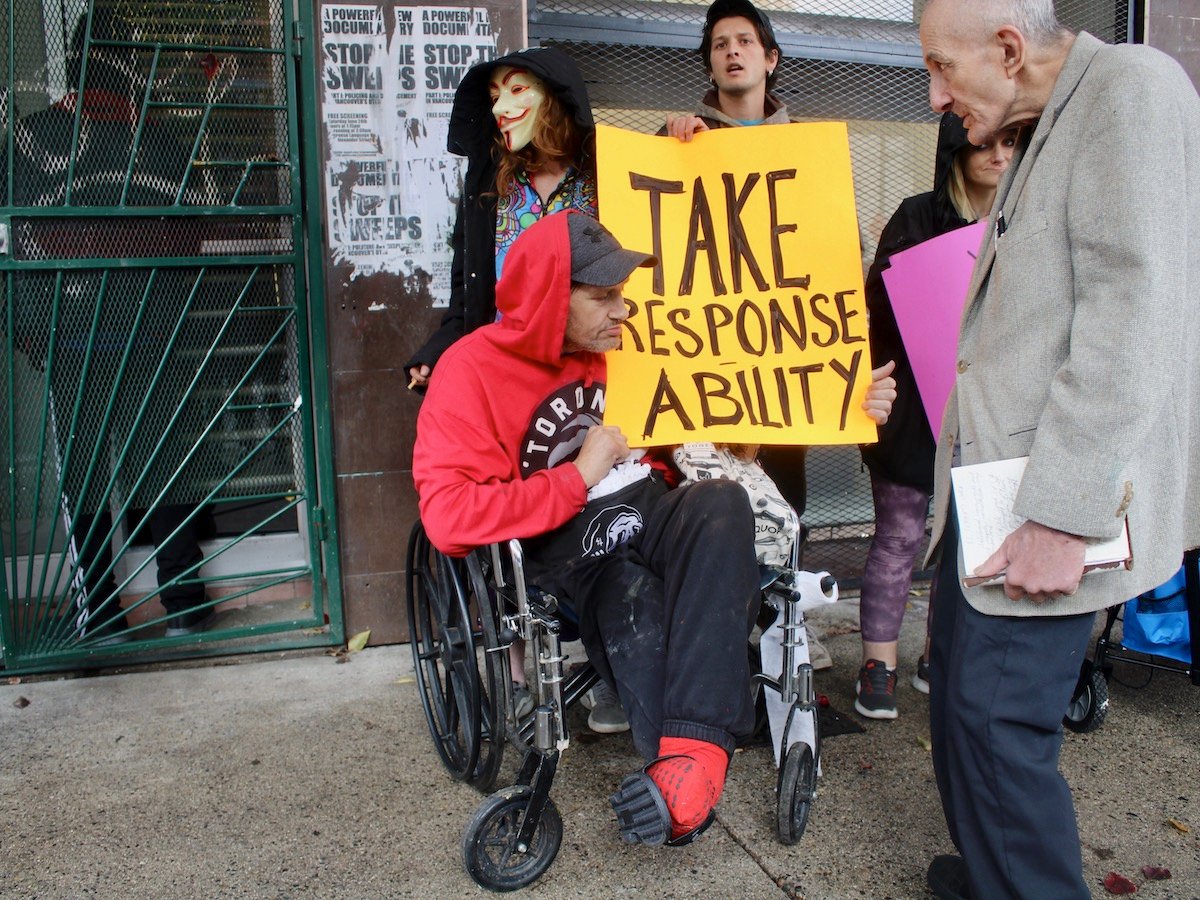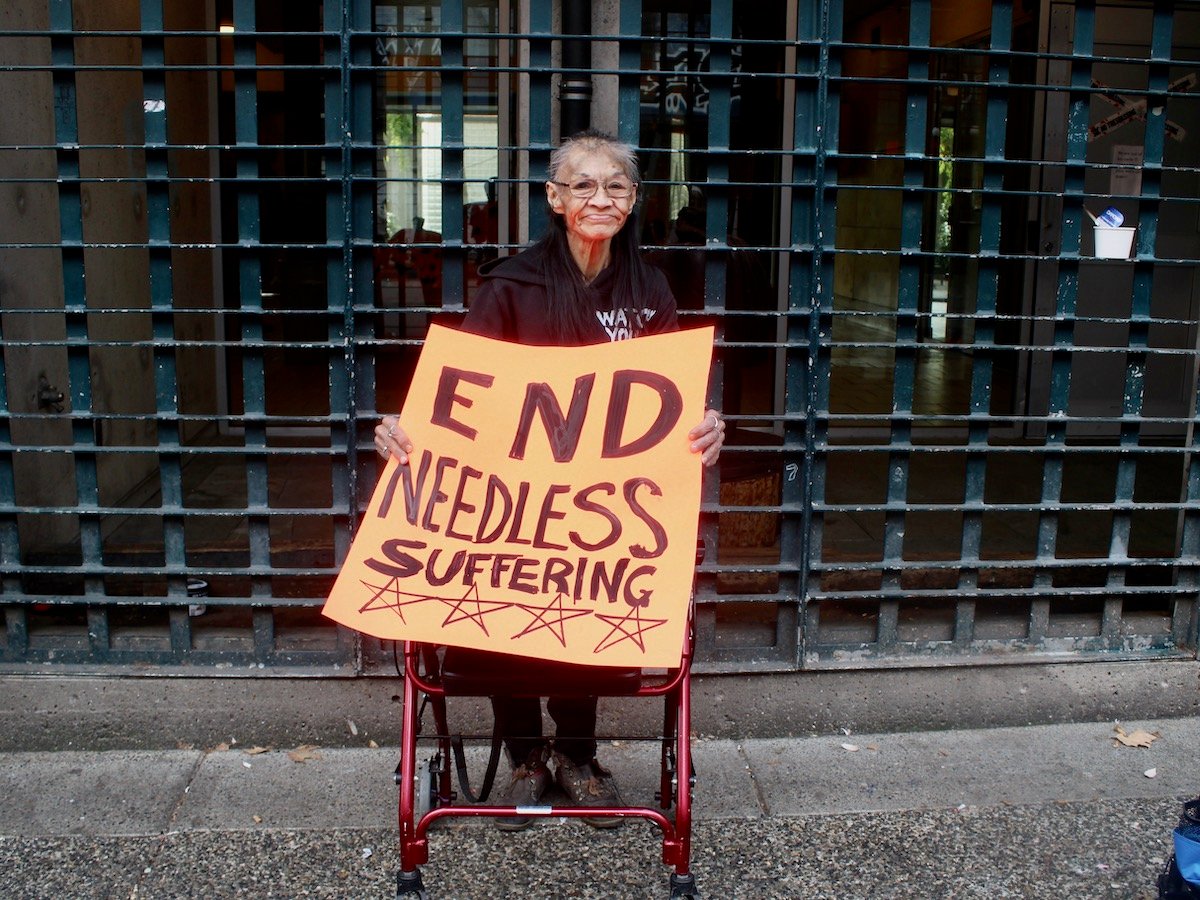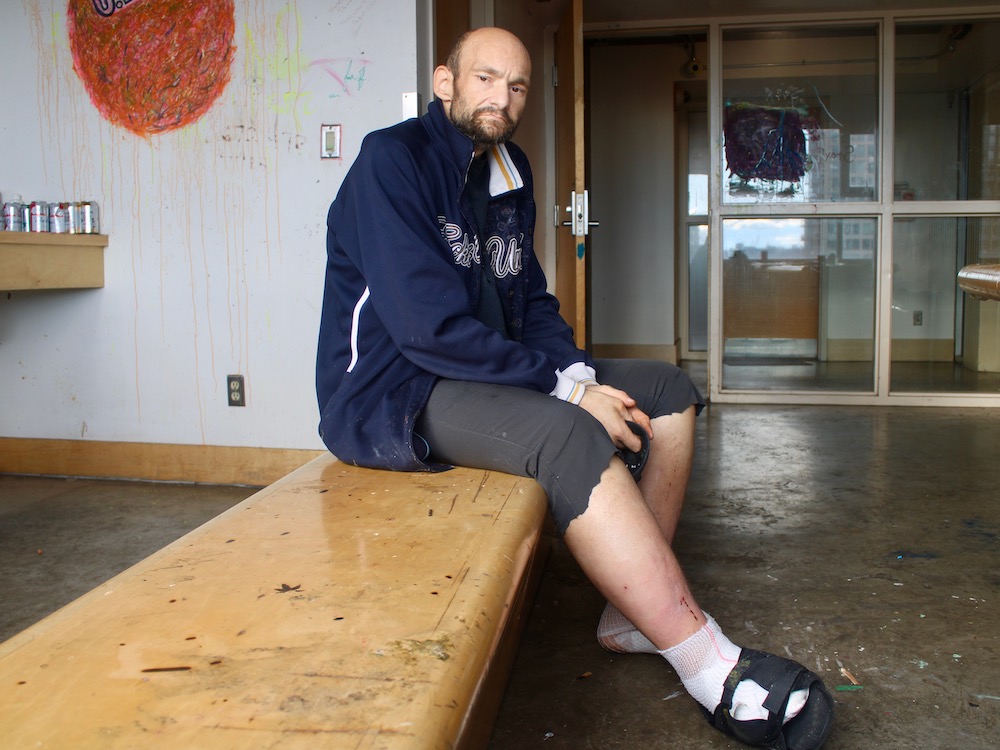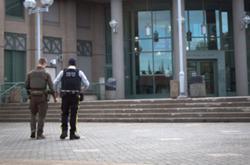A few months ago, Jason Reimer was dealing with painful diabetic ulcers on his feet. But he had beaten an infection and was optimistic that he was healing.
Today, Reimer has had all his toes amputated and has to go to hospital every few days for dialysis. Ulcers developed on both his feet, leading to another serious infection. Because of that infection, his kidneys no longer work and he’s been told he’ll likely lose one of his feet.
Reimer said he’s been given a prognosis of three to five years to live on dialysis. According to the National Kidney Foundation, the average life expectancy for patients on dialysis is five to 10 years.
Reimer said that while doctors told him to stay off his feet to let the ulcers heal, that was impossible at his supportive-housing building, the Portland Hotel at 20 W. Hastings St.
That’s because for over a year, the elevator has frequently broken down, leaving disabled tenants trapped in their rooms or having to brave a long and painful climb up as many as nine flights of stairs.
Some tenants who use wheelchairs have been moved to other buildings with working elevators. But Reimer said that despite asking several times to be moved, that option hasn’t been offered to him.
Reimer said he feels he’s gone from “being an otherwise healthy person — ulcers can be healed, I’ve healed them before — to a death sentence.”
Tenants at the Portland Hotel have now applied to the Residential Tenancy Branch for compensation from the operator of the building, PHS Community Services Society.
The tenants are arguing that the frequent elevator breakdowns and poor response to residents with disabilities are a breach of the non-profit’s responsibilities as their landlord.
Last week, the Community Legal Assistance Society filed a request for an order confirming that PHS should compensate tenants because of those breaches.
Like many of the Portland tenants, Kevin Usher uses a wheelchair. He said the elevator outage trapped him in his room for days, complicating the healing of his amputated leg and interrupting a planned transition to Crosstown Clinic’s medical heroin program. That program is intended to be an alternative to the dangerous tainted illicit drug supply, and Usher hoped to stabilize his drug use enough to be able to visit his dying brother.
“It was a very lonely time. I wasn’t in contact with my family and I had no phone,” Usher said. “It was exactly like being in jail.”

Betty Brooks, who uses a mobility scooter, said that when the elevator is broken she either stays in her room or braves an eight-storey climb — a painful and slow effort to reach the outside world and then get home.
Another tenant carried a sign that said, “We are not simply addicts.”

Advocates for tenants say they’ve heard many stories of tenants’ health declining because of the broken elevator.
Hamish Ballantyne worked at the Portland when the elevator first started breaking down in January 2022. The effect on residents was devastating, and while Ballantyne said staff at the building tried to help as much as they could, the PHS response to requests for information and help was insufficient.
“As staff at the building, we worked as hard as we could to support the tenants in their new struggles, but we simply did not have the tools,” Ballantyne said.
Ballantyne said some residents slept in the lobby in their wheelchairs, while others crawled on all fours up the stairs. One man was unable to leave his room for three months because his power wheelchair was too heavy to carry down the stairs.
Through it all, Ballantyne said, residents supported each other.
“I saw disabled people go down nine flights of stairs every day to go out and get their neighbours groceries,” Ballantyne said.
“I watched elderly people carrying disabled folks up the stairs because they couldn’t get to their rooms otherwise.”
Even though the building is relatively new — it was designed by renowned architect Arthur Erickson and opened in the late 1990s — the building has just one elevator.
According to the PHS website, the building houses people who “were at one time considered to be some of the city’s most challenging and hard-to-house individuals. Many residents live with concurrent physical and mental health issues, substance dependencies and other challenges.”
After repeated breakdowns, PHS and BC Housing now plan to replace the elevator. But residents and advocates who support them say they haven’t been given much information about that plan.
Some tenants who use wheelchairs have now been moved out of the Portland to other buildings. Usher said he’s been moved to Woodwards, another supportive-housing building operated by PHS, but he would eventually like to move back to the Portland. He said he’s been unable to get information about when he’ll be able to return to the building.
In an emailed statement, PHS Community Services Society said it can’t comment on the tenants’ allegations because of their application to the Residential Tenancy Branch for compensation.
“PHS denies any wrongdoing and is deeply committed to serving our residents, program participants and community members,” the organization wrote.
The non-profit has previously said supply chain problems led to delays in getting the needed parts to fix the elevator.
Residents have formed a tenants’ union with the help of organizers from the Vancouver Tenants Union and another advocacy group called Our Homes Can’t Wait.
In a previous interview with The Tyee, PHS executive director Micheal Vonn said PHS does not recognize the legitimacy of that union and refused to meet with its representatives.
At a rally last week, the Portland Tenants Union said that 60 residents at the building have now signed on to the RTB application for compensation.*
Reimer said getting compensation is not much of a motivation for him these days. He just wants people to know how people are treated in the supportive-housing and health-care systems.
“I want the public to know this is common in the Downtown Eastside,” Reimer said. “I think people need to know what’s going on down here and how people are being treated. And I mean, without judgment — I treat people differently myself sometimes — and it’s something to be aware of. We’re all human beings.”
* Story updated on Nov. 8 at 2:22 p.m. to correct the number of tenants who have applied to the Residential Tenancy Branch for compensation. Sixty tenants, not 60 per cent of tenants, have applied. ![]()
Read more: Rights + Justice, Housing

















Tyee Commenting Guidelines
Comments that violate guidelines risk being deleted, and violations may result in a temporary or permanent user ban. Maintain the spirit of good conversation to stay in the discussion and be patient with moderators. Comments are reviewed regularly but not in real time.
Do:
Do not: